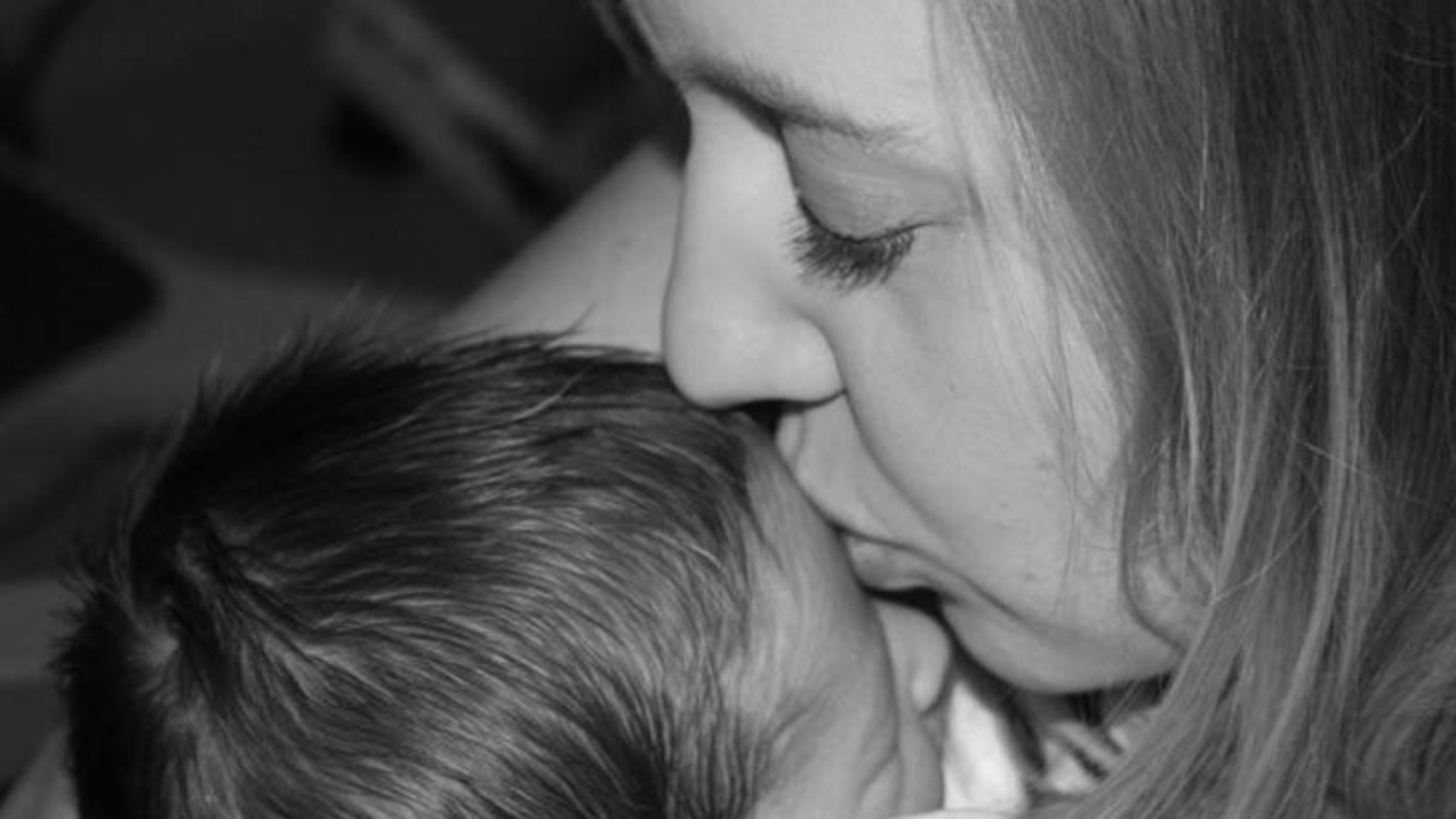Janet had been waiting years for a baby. Her first three pregnancies had resulted in early miscarriage. Finally, she was pregnant for the fourth time and had only a few weeks before the baby was due. No one could have wanted a baby as badly as she did. But the last thirty-five weeks of waiting had been more stressful than she could have ever imagined. In her mind, she kept thinking that something was going to go wrong. Surely she’d loose this baby just as she had lost each of her previous pregnancies. So she made a conscious effort not to let herself get attached to the baby growing inside of her.
The doctor insisted that Janet, who had been on bed rest since week twenty seven, be induced just as soon as the baby’s lungs were mature enough. In just a few more days, she was scheduled for an amniocentesis. Her bag was packed, she’d crossed everything off her list of what she needed to bring to the hospital.
As Friday came, Janet paced the floor waiting for her husband of three years to get home from school so they could head to the hospital, just a half an hour from their home.
When Scott arrived, Janet nervously handed him her hospital bag and ran one more time to the restroom. The doctor was scheduled to meet them at the hospital to perform the amniocentesis test. He was there on schedule as Janet checked herself into the hospital, providing the necessary paperwork and insurance cards.
Janet was more afraid of the needle than she was of giving birth. However, the test went as planned. She hadn’t eaten all morning though and hadn’t planned on having to stay in the hospital to be monitored. She was surprised when they checked her into a room, and Dr. Moore came in shortly after. They had said they’d only need to monitor the baby for a short time before she could leave the hospital and await the results of the test elsewhere. The results would be in in just a few hours, and Dr. Moore said he wanted to induce her just as soon as he learned the baby’s lungs were mature enough to do so.
Janet, however, was a little confused. She had spent the last few months trying to keep the baby in, and now the doctor was more than a little anxious to get the baby out. She had had to have shots and medication, not only to stop her early contractions, but also steroids shots to help the baby’s lungs mature in case she did deliver early.
Dr. Moore was the best doctor she knew. She had had some terrible doctors before she found him. The first doctor she went to when she was first expecting and was experiencing difficulties had told her it was no more than a urinary tract infection, without even checking the ultrasound. Then she saw Dr. Moore, who cared enough to check the ultrasound, but unfortunately saw her after it was too late to do anything.
“More than likely, you will lose this pregnancy within this week,” he had told her sadly. “But after three miscarriages, most doctors will send you to a specialist. And this will be number three. Next time, we will know what is happening and get it right.”
So Janet truly felt she had fought hard to keep this baby in, and now was weary about letting it out so soon. But, she trusted Dr. Moore, and if he felt that the longer the baby stayed in the more chance she had of something going wrong, she’d trust him. Only she hadn’t expected this. The doctor was in her room with some kind of a noise maker, making sounds on her stomach. When she had asked what it was, he had explained that the baby was not moving or responding since the amniocentesis, and the noise maker would hopefully get her moving around again. Janet had been noticing contractions ever since they finished the test and was a little surprised by their regularity.
Soon enough, she felt the baby jumping around and kicking her in the ribs once more. Dr. Moore released her and said he’d call once he had the test results. The half-hour back to the house seemed unbearable, and Janet didn’t want to wait around at the hospital, so as hungry as she was, she asked her husband if they could go out for a bite to eat.
He took her to a nice Italian restaurant. The nurses had told her that the sooner she got the sterilizing red medicine off, the less likely it would be to stain, so she spent the majority of the time in the restroom with soap and water on a paper towel. One lady had come in and been terribly concerned. After all, here was a pregnant lady with red stuff all over her abdomen.
It turned out that Janet wasn’t as hungry as she thought. She barely had a bite to eat before she lost her appetite from the timely contractions she kept having. Shortly after, the doctor called and confirmed that the baby’s lungs were mature and said that he wanted her at the hospital immediately to start the induction.
When Janet arrived at the hospital that morning, she had considered the probability of delivering that day, but now the reality set in. She could very well be a parent in the next twenty-four hours. When the doctor arrived, he found that her contractions were too regular to use anything too strong to encourage the contractions to continue. He couldn’t use the Cervical, because she was already having to consistent of contractions. So he went with the IV induction liquid and hoped it would do the job.
But the only job it did was put Janet in more pain than she’d remembered ever being in. After twenty-six hours, her contractions were way too hard and close to continue the IV, but she had only dilated to a four. And worst yet, the baby’s heart monitor kept going off.
Janet knew for sure that something was wrong when there were ten nurses in the room, and they had phoned the doctor. When he came in the room, he explained that they’d be performing an emergency cesarean, but was vague on why. Apparently, every time Janet had a contraction, the umbilical cord was being closed off to the baby and her heart beat was dropping below the safety zone.
“Here goes,” Janet thought, “I knew I’d never get to hold this baby anyway, so I guess I prepared myself for something like this going wrong.” She couldn’t hold the tears back, though. Apparently she had become attached to this baby. It was a girl, she knew. She even knew her name. Virginia Rose she’d be called, and Janet had a pretty good idea of what she’d look like too.
No one could have been more surprised than Janet when after only a few minutes of being rushed into the operating room, the doctor held up a little girl, white stuff covering her and screaming like newborns do. Janet looked up at her husband and realized that every minute of what she’d gone through, including the three previous miscarriages, the preterm labor and the bed rest, and twenty-six hours of long labor had been worth it.
She told Scott to please stay by the baby’s side and that she’d be okay. Being a mom was a real thing now. She had waited, and now her dream of being a mother was true. She had reached her goal. But now what?
It didn’t take Janet long to realize that motherhood was not what she expected. She had longed to hold her own baby in her arms for years, but had not envisioned it being like this. Janet had to stay in the recovery room until the doctor okayed her to move into a post-delivery room. But she still hadn’t been able to see her newborn since the doctor had held her up for Janet to see. Thoughts of “what if” ran though her mind as it raced to see what the worst scenario it could come up with was. She kept asking and asking, but none of the nurses seemed concerned about knowing anyone’s condition but hers.
After an eternity of waiting, a pediatrician came in to tell her that her baby was doing fine. “She has low blood sugar, and her oxygen level is low, so we’ll be keeping her in the neonatal intensive care unit until she starts looking better.”
He had sounded promising, but Janet had never experienced anxiety like this. Finally, she begged one of the nurses, who told her she was too weak to get out of her bed just yet, to wheel her bed into the NICU so she could see her baby. Her hospital bed barely fit into the room, but it did. And when she saw the baby, she knew was hers. She couldn’t hold the tears back once more. And just like Scott had promised, he hadn’t left Virginia’s side since she came into the world.
Unfortunately, Janet couldn’t hold Ginny, short for Virginia she’d decided, because of all the monitors and cords she was hooked on to. But she felt better seeing her at least, knowing that everything would be okay, and that was why she was finally able to fall into a deeply needed sleep.
The next day brought most of the same, except the nurses were willing to let Janet hold Ginny and try to nurse her. But Ginny just wanted to sleep. The nurses insisted that Janet try harder, but she ended up only getting frustrated and giving in to the bottle after Ginny had cried and screamed.
“But she needs the first of your milk,” one nurse had said. “There’s nothing that can replace it.”
But her encouragement only made Janet feel like more of a failure. After all, she’d cheated the birthing experience, right? There was nothing natural about being cut open and having the baby pulled out. And she couldn’t tell anyone she’d gone all natural now, like she’d hoped to, because they’d had to give her anesthesia in order to perform the C-section.
Three days later, Janet was still in the hospital. She probably could have been released, but Ginny couldn’t be so what was the point? Ginny had been consistently losing weight. She was born at 5 pounds 11 ounces and now close to 4 pounds. “It’s kind of normal,” the pediatrician had told her. “Just keep trying to breast feed, and if she doesn’t start gaining weight, you’re going to have to go with formula feeding.”
“But I can’t do that,” Janet had told herself. “Cheating birth was bad enough. I have to breastfeed my baby.” So she tried and tried, and no matter what she or the nurses who tried to assist her did, nothing worked.
Janet and Ginny were finally released from the hospital, but Ginny had to come down to visit the pediatrician every day anyway. After another week had passed, and Ginny wasn’t gaining weight, the doctor really put it to her. “Just give her the bottle,” he’d said. And Janet had gone home with lots of bottle food for Ginny, but still feeling like a complete failure as a mother.
“I’ve only been a mom for a week and a half, and look how terrible I am at it!” Janet had confided in her husband later that day. “I can’t feed my own baby, and besides that, I can barely sit up well enough to meet any of her other needs.”
Janet was grateful her mother had been there with her since she’d come home. She seemed to know what to do. After all, she’d given birth to fourteen children.
As the days went by and Janet’s mom had returned home, Janet’s feelings of hopelessness and failure had begun to consume her. She never felt hungry, and when she was alone with her baby, she was more than a little overwhelmed. When Ginny was just two weeks old, Janet had turned to her brother-in-law to watch her so she could go out with Scott alone, even if it was only to the grocery store to get more formula.
After a month, Janet’s realization that motherhood was not what she expected had grown into the theme of her every day. She fed Ginny, changed her, fed her, and then changed her again. Janet had also realized something very strange about herself. She was frightened to give Ginny a bath and to be alone with her at all.
She knew something was wrong, but when she’d asked her mom if she ever felt that way, knowing that if anyone ever had, someone who’d given birth as many times as her mom would have. But her mom had just shrugged and changed the subject.
Janet was counting down the days till graduation, to the time when they’d move back to Scott’s parents’ house for the summer. Fortunately, she’d finished her classes to earn her bachelor’s the month before Ginny was born. After all, there was no way she could have handled school and this baby at the same time.
Virginia was so temperamental. She cried and cried. Janet couldn’t think of a time Ginny wasn’t crying. Janet knew she should be the one getting up and feeding her at night, but she just didn’t have the energy. Scott still had a semester of school left, and she felt guilty every time he’d gotten up with the baby. She also felt guilty about how the minute he’d walk in the door, she’d hand over the baby and run into her room, desperate for a little sleep.
March came and went. Janet went to her six-week checkup and refused to confide in her doctor how she was really feeling. After all, it was probably just the baby blues she’d read about one time. And they didn’t last long. Besides, she had hidden her feelings so well from Scott, whom she’d always confided every detail to before the baby’s birth, so she couldn’t tell her doctor.
It was April now. Graduation day came. Janet and Scott got to walk to receive their diplomas together, hold a luncheon with their families to welcome Virginia Rose into the world, and moved out of their apartment all in one day.
Janet was excited for the first time in weeks to be able come to a home where someone would be with her and Ginny most of the time. They moved into the house with Scott’s parents for the summer to save money for Scott to begin law school in the fall. Scott had found a great job for the summer, and considering they’d already lived there two of the last three summers, there weren’t too many new adjustments to make.
By the time May came along and Ginny turned four months old, Janet realized she wasn’t getting any better. If anything, she was getting worse. “But how was that possible?” she’d asked herself one day.
She knew she needed to talk to someone, but her symptoms had been getting so bad, she dared not confide in anyone. If anyone knew what she was feeling, she knew they’d take Ginny away from her. And Janet loved Ginny. She knew that. She’d gone through too much to get Ginny here to have her taken away. So she kept to herself and put on an excellent facade of being blissfully happy.
She was visiting her sister out of state when everything overwhelmed her all at once. Scott had gone home early to get back to work, but Janet had stayed. “What is bothering you?” Mary had asked. “I know something is wrong. I know you’re not scared of the dark, yet you used that excuse to have someone stay in the guest house with you and Ginny.”
Janet couldn’t hold it back any longer. “I am a failure as a mother. I have thoughts of harming my baby all the time, and I’m so afraid I might actually do it!”
Mary didn’t seem as shocked as Janet had expected. She held her and let her cry and cry. “I didn’t know I had any tears left,” Janet said as soon as she could speak. “I’ve been crying nonstop ever since Ginny was born, and I thought it’d go away. Obviously, I was wrong.”
Fortunately, Mary was in the beginning of medical school and was currently enrolled in a psychology class. “You know, Janet,” she said understandingly, “You’re not a failure, and this is not your fault.”
Mary proceeded to draw a map of the brain and explain the process of serotonin and other chemicals in the brain. “What’s going on with you is a lot like having a broken leg. If you had a broken leg, what would you do? Walk on it until you could walk no more?” Between her sobs, Janet was able to get out that she’d probably go see a doctor.
Even though it was late, Mary convinced Janet to call Dr. Moore and drove her to his office the next day to pick up some medication. Dr. Moore told Janet to start taking the medication immediately, but that she needed to see a psychiatrist as soon as possible. After Janet promised Mary and Dr. Moore that she would, she flew home to her still unknowing husband.
Janet, who’d always been 100% honest with Scott in all the years they’d been married, didn’t understand why she had such a hard time telling him what was happening. So, she put on her happy face and went another month before breaking down and setting up an appointment with a psychiatrist like she’d been told to. She figured that once she had her appointment, she’d have to talk with Scott and so had done her best to avoid it.
When she finally felt ready to talk to him, she left out the major detail of her thoughts and just told him about her lack of energy and appetite. “I just need to talk to someone about it,” she’d told him. Deep down, she knew why she wasn’t telling him the whole truth. “He’ll send me far away. He won’t let me be close to my baby ever again if he knows what I think when I am near her,” Janet had told herself. Somehow she knew he wouldn’t really do that, but the “what if” demon had taken her a long way down the worst case scenario street.
So when she went to her appointment, she didn’t even let him go in with her. She wasn’t 100% honest with the psychiatrist right off either, but fortunately the appointment was worth her visit. Having moved out of state after graduation, Dr. Moore was no longer close by, and Janet hadn’t found a doctor she felt comfortable seeing. Julie, the psychiatrist, scheduled an appointment with an obstetrician to help her start getting her hormones back in balance. She raised the medication Janet was currently on after seeing no benefits from it after six weeks and talked to her about the importance of eating healthy, exercising, and getting enough rest.
Janet knew she was getting more than enough rest, though. The only way she dealt with the thoughts she was having was by putting Ginny and herself down for a nap whenever they were alone, which was more frequent than Janet had hoped it would be. She hardly remembered the last six months. They were all a blur, probably because she actually had slept through most of it.
When Janet was awake, demanding thoughts kept entering her mind. “Ginny would be better off without you. You know it, and I do too! You know everyone would be better off without you. You are a terrible mother and a horrible wife. People would be a lot happier if you were gone.”
Those weren’t the worst of her thoughts though. The worst was when thoughts of harming Ginny came into her mind. Janet couldn’t stand being around the windows, water, fireplaces, or anywhere near the kitchen because of the images kept creeping into her mind. Something kept telling her how much better Ginny would be if neither of them were alive.
The hardest part for Janet was that she knew these thoughts were not her own. She knew it. Yet, somehow it kept getting harder to distinguish her thoughts from this great “if only” and even it began to be an “only if” thought. Janet felt consumed by these thoughts, as well as controlled by them, because she was slowly losing her sense of reality and her ability to distinguish thoughts that were her own.
What Janet hadn’t realized until Mary had pointed it out was that the thoughts were not going to go away on their own. Or her own. Ginny was six months old, and everything had been getting worse and worse.
Over the next few weeks, Janet focused on exercising and eating lots of protein. She met with the physiatrist, Julie, once a week. What she hadn’t expected, though, was that this whole process would take as long as it was now taking.
Janet had somehow thought that as soon as she met with the physiatrist, all her problems would disappear. What she was now realizing was how much work this was going to take. After all, trying new medication every few weeks and waiting to see if it was the right one for her was taking more patience than she had. Then came the day that Julie insisted on Scott being in one of her sessions.
“Scott,” Julie said, “do you realize the severity of this situation?”
“Sure,” Scott said, thinking Janet confided more in him than this person she had barely met.
“So you know Janet is not allowed to be alone with Ginny? Or with herself for that matter?”
Scott looked at Janet in alarm. “I guess I didn’t realize it was that serious. I thought Janet just had the baby blues?”
“Janet,” Julie said, “I think you better tell Scott what your worst thought has been.”
Janet had begun confiding in Julie more each week. She couldn’t help but be terrified of what would happen next as the great “what if” had been working more and more on her each day, telling her what would happen if Scott found out. “He’ll leave me. I know it, and he’ll take my baby with him.” Janet had recently concluded when deciding not to tell Scott any details.
“Scott, I know that law school starts in just a week. I know you’re planning on moving and that Janet and Ginny will be moving into an apartment on the other side of the state with you,” Julie told Scott. “Only I’m not sure you realize the seriousness of all of this. If you move and go to school like you have planned, Janet will be left home with Ginny all day, not to mention all night, as I’m sure you’ll be spending a lot of time studying. To help you realize how serious this is, I will just tell you now, that should you precede as planned, I will be contacting Child Protective Services, and I doubt you’ll be happy with the results of that. I think I’ll just let Janet take it from here and end today’s session.”
As furious as Janet was that Julie had broken her confidence, she honestly felt a little relieved to not have to hide such a big secret from Scott. After all, she’d never kept secrets from him, not one. But when they got into the car to head home, the relief melted away as Scott spoke.
“Janet, Julie has just asked me to give up an awful lot based on something I didn’t know was such a big deal. I will make the necessary changes, but it’s going to be a lot harder to do based only on what Julie is telling me. I don’t know what to believe. I thought you were just a little down? Can you tell me what your worst thought has been, like Julie asked you to?”
Janet couldn’t fight the tears she’d been holding back any longer. She cried. And cried. And cried. When she was finally had no more tears to cry, she spoke in a very soft voice, “Scott, I’m afraid to tell you for fear of losing Ginny, but the truth is, even if someone does take Ginny away from me, at least she’ll be better off. I only want was best for her.
“You asked for my worst thought, so here it is. Last week, just the day after we’d gone for a walk by the river, I drove back over the bridge and stopped the car. I came so close to putting Ginny in that river, where the water flows the fastest, that it scared me. It scared me so much. I haven’t driven or held her since.”
Scott reached out as Janet fell into his lap and sobbed tears she thought she had no more of. He held her and gently stroked her cheek, wiping her tears as they fell down her face. She continued to describe how long and deeply she’d been dealing with her thoughts of hopelessness that had accompanied her after the birth of her daughter.
Later that night when they returned home, Scott informed the law school of his decision to withdraw. He wanted to take Janet’s suffering away, and realizing he could only ease it, he developed a plan so she would never have to be alone with her thoughts again. He was grateful they had decided to stay with his parents after all and began to realize how important having their help would be.
Janet was surprised at the support she received from both her parents-in-law and from Scott, although she knew she shouldn’t have been. She’d always known they’d be there for her, but hadn’t realized how much sharing her burden would release her from the bitter world she’d been living in since Ginny’s birth.
Scott quit his summer job, just a week shy of his last day, to accommodate they psychiatrist’s orders and be home to care for his girls.
“Thank you for telling me,” he told Janet one night. “I had no idea what you were going through. My only wish is that you had told me sooner. You have been suffering too long.”
“I was so afraid you’d want to get rid of me, the monster who wanted to hurt your baby, so much that I just couldn’t bring myself to. But now I know I was wrong and that you’d never do that. I wish I would have told you sooner, too. Julie says that the longer this kind of thing goes untreated, the worse it can get.”
“Everything is going to be alright now,” Scott said. “I know we still have a long path of recovery, but now that we’re sharing the burden, everything is going to be okay. I’ll always be here for you, and I’d never think of leaving you alone in this. You’re my wife, the mother of my child, and I will always love you. I am sorry I didn’t notice sooner. Looking back now, I guess I should have read the signs.”
“That’s all in the past now, and considering how much I tried to hide it, I don’t see how you could have known,” Janet said. “I just feel bad about you not being able to go to law school like you’d planned. I feel a lot of guilt about everything, and knowing that I made you give up your dream makes me feel even worse. Do you think the law school here would let you in still? I know we turned them down before, and that class would start really soon, but maybe they’d still take you?”
Although Scott didn’t want to do anything to jeopardize the health of his girls, upon Janet’s insistence, he finally called the local law school, learning that they were not only willing to allow him admittance, but also to give him the academic scholarship he’d been awarded when he’d been accepted there originally, and they were willing to let him take night classes so he could be home with Janet and Ginny during the day. While his parents, Ben and Emily, both worked during the day, they were both home at night and could take it over the girls’ care after they got home.
While things looked brighter for Janet than they had for several months and her lonesome suffering seemed to be over, the worst was yet to come. As the doctors continued to try for the right medication combination and Janet continued counseling, she continually fought the battle of what was now diagnosed as the postpartum mood disorder postpartum psychosis.
What Janet found interesting was that the professionals she saw never used the term in front of her. Most used some form of the word, “postpartum depression.” It wasn’t until Janet found a website open on the computer that she realized Scott and his parents had been told something she hadn’t.
As she read the content, she was surprised to find her symptoms matching those described on the screen. Words like, “most extreme, rarest, form of postpartum mood disorders” and “losing touch with reality” accurately described her last few months. “Hallucinations, delusions, illogical thoughts, insomnia, refusing to eat, extreme feelings of anxiety and agitation, periods of delirium or mania, suicidal or homicidal thoughts” appeared on the screen.
She continued to stare in shock as she read about how few women speak to someone about their problem and sadly read on to see the tragic consequences that come from women failing to speak up about their symptoms. Stranger to her still was that she didn’t have even one of the qualities that puts a woman at higher risk. Neither her nor any of her immediate family members had experienced any kind of depression, been bipolar, or suffered from schizophrenia.
Janet watched herself in the mirror later that night, remembering how long it had taken her to speak up, and slowly realized that the professionals’ definitions of the sickness met her idea of qualifying someone as crazy or psychotic. Except this time, it wasn’t someone else, and the words hit home. “I am crazy,” she thought, wondering how anyone could stand to be around her.
She was exceedingly grateful for the right diagnosis, though. In her reading, she found a common theme of professionals misdiagnosing the problem as postpartum depression and the subsequent mistreatment that followed. She was sad to realize that she still had a long road ahead of her. According to the article, most women suffer postpartum depression after their postpartum psychosis symptoms have subsided. Realizing the road she had yet to travel, paranoia definitely set in and rated at the top of her list of symptoms.
Janet suddenly felt startled as she thought back to how hard and long the process of getting Ginny into the world had been. “Only moms who don’t want their children have things like this happen to them,” Janet incorrectly thought to herself. “I wanted Ginny so badly. I just don’t understand how something like this could be happening to me.”
Then she remembered what her psychiatrist had said about how actually, most women who work the hardest and want children the most suffer with postpartum mood disorders. “None of this makes sense,” Janet realized as she laid in bed for yet another night of sleeplessness.
Blog Author: This blog author has asked to remain anonymous. All names in this story have been changed. I have two beautiful daughters. I had postpartum psychosis with my first daughter. I have had no postpartum mood disorders at all whatsoever with my second.
For those of you desperately reaching for hope, you will find it. This trial will become a blessing in your life, as it has mine. I am healed. What I have learned from this dark chapter in my life is that “this, too, shall pass.”
I have learned that like any of life’s trials, the only way to make it through is to have faith in our Savior, Jesus Christ. Faith that He will protect you. Faith that He will preserve your child. Faith that Jesus Christ Himself has felt what you are feeling in a way that allows Him to succor you. He is there. Even when you feel your prayers are bouncing off a cement ceiling, never leaving the ground. He is there. He is listening. He will guide you. He will direct you. He will protect you. He will protect your children and watch over them.
If you feel as I felt, unworthy and an enormous amount of guilt associated with the fact that you have this trial in your life, the truth is no matter how righteously you live your life, trials happen. No matter how much you love your child, trials happen. The purpose of life is not to avoid trails. The purpose of life is to let them refine you, as it has me.I am more patient. I am more kind. I am quick to forgive. I know that I have no control over what trials come into my life. I have turned my life over to Christ.
What I can promise you now is that as you put your trust in the Lord and when you feel those worrisome thoughts or unwanted anxiety, push it out of your mind and say, “Let God’s will be done, and His timing also. I don’t need to check if my daughter is breathing. I don’t need to worry she’ll fall out of the window. God Himself is watching over and protecting her. I do my best, and He makes up for the rest. All is well.”









